A New Wave of Legal Rebels

It’s a talented 10 we honor in this, the eighth year of the Legal Rebels.
Once again celebrating those women and men who are remaking their corners of the legal profession, the ABA Journal and its readers have found ample evidence of innovative thinking and forward action.
This year’s Rebels represent all parts of the profession: From a law firm managing partner who overhauled her firm’s customer service process to a law professor who took a bad experience with a traffic ticket and turned it into an online adjudication project. Not surprising: A computer scientist helps develop the biggest artificial-intelligence effort in law. Surprising: A staff attorney for a state public defender’s office is also a data scientist.
We have a leader of in-house legal operations; a law librarian whose census shows how public data is kept from the public; an entrepreneur who developed both GovLab, which seeks to change government through transparency and collaboration, and MeWe CoInspect, which helps food trucks comply with government regulation.
Add in the lawyer who helped turn technology-assisted review into a buzzword—twice—and a professor inspired by vagueness in law to develop software that finds contract ambiguities. This year, we even have one of the ABA’s own, a past president able to achieve some hard-won successes in model regulatory objectives for nontraditional legal service providers.
Opening a Window on Closed Data
Sarah Glassmeyer has spent the past year as a research fellow at the Harvard Library Innovation Lab studying how government publishes law. And how little is available to the taxpayers who finance it.
Her work includes a census of 50 state regulation websites and 105 court websites. And her study found at least 14 barriers to accessing legal information, including how the information is stored and cataloged and the availability of bulk downloads.
“These barriers exist for both the individual user of a resource for personal research as well as an institutional user that would seek to republish or transform the information,” she notes in her report. “At the time of the census, no state provided barrier-free access to their legal information.”
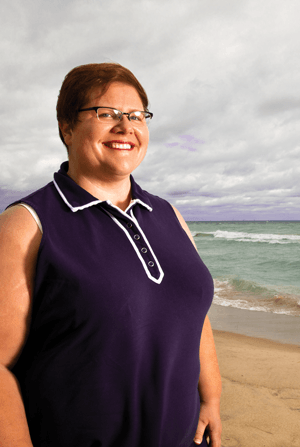
Sarah Glassmeyer. Photograph by Wayne Slezak
“I really hope that in 20 years, everything will be digitally published for free,” says Glassmeyer, 40, a law librarian by trade. On her website, she also describes herself as a lawyer, educator, “free-law enthusiast, advocate of justice, social media aficionado, emerging tech geek, raconteur and bon vivant—and coffee addict.”
Her research, available online for free, found that some states restrict downloads of codes and opinions, and include a copyright notice with posted information.
“I assume state legislatures see this as a moneymaking opportunity,” Glassmeyer says. “They think that if they copyright it, they can sell it to Westlaw.”
For the most part, Glassmeyer says, she hated law school: She disliked both the competitiveness and the teaching style; however, she couldn’t see herself practicing law but wanted to do something that helped people. So she got a master’s degree from the Indiana University School of Library and Information Science in 2005.
“Library science is the happiest accident of my life,” she says. “I love working with self-represented litigants, and a lot of what I do is what I would have done as a legal aid attorney, without the commitment and being weighed down too much by the actual practice of law.”
—Stephanie Francis Ward
» Read extended profile of Sarah Glassmeyer
Putting ‘AI’ in Law Practice
Digital assistants that can handle legal inquiries like a super-Siri, answering your spoken question with a response with case law links, would never make money. That’s what many people told computer scientist Jimoh Ovbiagele—mainly because attorney incomes depend on being paid for legal research.

Jimoh Ovbiagele. Photograph by Tony Avelar
Then the Toronto Globe and Mail wrote a 2014 article about Ovbiagele’s project, which he and other University of Toronto students made using IBM’s Watson cognitive computing system. And after that story ran, NextLaw Labs, an independent subsidiary of the legal giant Dentons, became an investor in what is now known as Ross Intelligence.
When Ross got funding, Ovbiagele left college and moved to California, and the company is now headquartered in San Francisco. In May, Baker & Hostetler announced it would be licensing Ross Intelligence to use in its bankruptcy practice. Other law firm subscribers include Latham & Watkins and Wisconsin’s von Briesen & Roper.
Friends says Ovbiagele, 23, is a genuine and curious listener. That may be why he saw room for Ross in the law firm market when others did not. To him the problem seemed apparent—clients need legal research, but they increasingly can’t or won’t pay for it.
And he’s seen firsthand the problems individuals have paying for legal services. When Ovbiagele was 10 years old, his mother, a nurse from the Philippines, wanted to divorce his father, a Nigerian immigrant. But she couldn’t afford the legal fees, and the two are still married, although they lead separate lives.
Ovbiagele doesn’t see people using Ross as a way to get legal help without hiring a lawyer, but he does think the service will allow legal services to be delivered at a more affordable price.
“Justice isn’t accessible for everyday people,” he says. “Although there are fewer positions for lawyers today, 80 percent of the people who need legal representation can’t afford it. Technology will be an opportunity for small bands of lawyers to address this.”
—S.F.W.
» Read extended profile of Jimoh Ovbiagele
Writing Off Legal Troubles
When a drafting error made it all the way to the U.S. Supreme Court, Gurinder “Gary” Sangha started thinking.
In King v. Burwell, the fight was over the language Congress used when it passed the Affordable Care Act. The law referred to “an exchange established by a state,” so the plaintiffs argued that no tax credits were available via federal exchanges. But without those tax credits, the whole system could collapse.
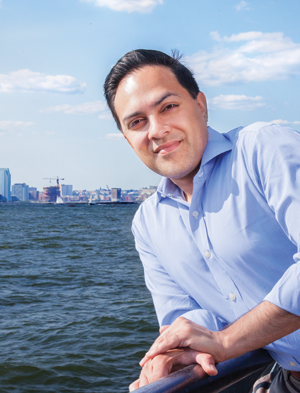
Gurinder Sangha. Photograph by Len Irish
“I just thought, ‘Wow, I can’t believe that millions of Americans could lose their health care because of a simple error by a staff attorney,’” says Sangha, 37.
Sangha is a lecturer at the University of Pennsylvania Law School and a fellow at CodeX—the Stanford Center for Legal Informatics. That gave him access to both universities’ computer science and linguistics departments. So he talked to some researchers in computational linguistics, which uses computers to solve problems related to human languages. They said they could help.
That was the genesis of Lit IQ, the company Sangha founded in 2015. Lit IQ’s software permits attorneys to automatically find ambiguities that could cause problems. The company’s internal research found about a quarter of commercial disputes include a dispute over contract language.
“There’s a big difference between litigating over a document that’s airtight and litigating over a document that’s full of loopholes and inconsistencies,” Sangha says.
Lit IQ is still a young company; it launched its software early this year and has been raising money through venture and angel capital. But it’s not Sangha’s first legal technology startup. His previous venture, Intelligize, allows users to search SEC filings, corporate documents, transactions and other documents useful to corporate attorneys. It’s been successful enough—its clients include Fortune 500 companies—that Sangha was able to step down at the end of 2013.
Shipra Dingare, lead engineer at Lit IQ, says the experience is paying off.
“It’s nice when the person in the driver’s seat is someone who really knows what they’re doing,” says Dingare, who trained as a barrister in the United Kingdom. “He knows about getting investment. He knows what investors are looking for. He knows what’s going to be compelling” to law firms.
—Lorelei Laird
» Read extended profile of Gurinder “Gary” Sangha
Googling Up In-House Efficiency
These days, it seems as if Google tracks absolutely everything about everyone. In fact, if you Google “Google tracks everything,” you get about 37 million results. So it might be shocking to learn that, within the last decade, Google’s ability to track data stopped at its own doorstep—or at least at the front door of its legal department.
Mary Shen O’Carroll remembers that when she took over Google’s legal department in 2008, she was surprised her new department was, essentially, in the dark when it came to data and analytics.

Mary Shen O’Carroll. Photograph by Tony Avelar
“Running an in-house legal department was worldly different than running a law firm,” says O’Carroll, 40, who joined Google after five years at Orrick, Herrington & Sutcliffe, where she served as profitability analysis manager. “Law firms track everything and know what everything costs. They have very good data and analytics. On the other hand, we had very little to no data on the legal department side. We had no visibility on what we were spending.”
Some of her changes involved putting in basic processes like having standard engagement letters and billing guidelines, items she calls “low-hanging fruit.” She instituted Google’s Outside Counsel Dashboard, which allows Google lawyers to see real-time information relating to their outside counsel spending, and includes an e-billing system. Her LinkedIn profile describes developing “processes and policies resulting in millions of dollars in annual savings.”
“It took a long time to become this fairly mature legal department compared to others,” says O’Carroll. “But I think we’ve succeeded—and even paved the way for others after us.”
O’Carroll is passionate about collaboration, both within Google and amongst the legal department field. She sits on the leadership team of the Corporate Legal Operations Consortium, an organization that brings together legal operations professionals to exchange ideas on everything from best practices to innovation.
As Susan Hackett, CEO at Legal Executive Leadership, points out, collaboration like the consortium advocates isn’t something lawyers are known for.
“Mary believes in the power of teams to exponentially multiply results delivered,” Hackett says, “so she’s spent a significant amount of time helping them to leverage that power by driving communication, collaboration and engagement strategies throughout the department.”
—Victor Li
» Read extended profile of Mary Shen O’Carroll
Go to Court Without Leaving Home
A few years ago, J.J. Prescott went to court to deal with a traffic ticket. The University of Michigan Law School professor waited four hours to have a very short informal hearing.
“Imagine if I lived in a rural area where the courthouse was two hours away,” he says. “And as a result, I had to miss an entire day of work to go to court, which, if I were paid by the hour, would equate to $100 or more in lost wages. All of that aggravation, all to come over to have that conversation.
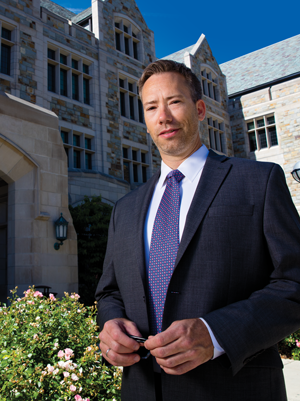
J.J. Prescott. Photograph by Wayne Slezak
“I can’t believe that in 50 years, that’s how our courts will operate.”
They might not, and Prescott’s work could be a reason why. The U-M Online Court Project, which began with his collaboration with former student Ben Gubernick, created an online platform allowing citizens to resolve smaller legal matters—civil infractions, plus minor warrants and misdemeanors—online. Users submit their side of the story and other information, answer questions and eventually hear from a decision-maker.
Prescott, 42, says at least half of court cases are minor matters that could be resolved this way: “It can happen the way you request an increase in the credit limit on your credit card—at 11 p.m. from your couch.”
The project was in the beginning stages when Prescott got the ticket. With a grant from the University of Michigan, he had a prototype made and convinced the Michigan state court administrative office to give the project access to court data.
Prescott’s startup Court Innovations is collecting data on public response, but early feedback is good. Court Innovations heard from one user who appreciated the platform because she works 12-hour days every day the court is open.
Court Innovations CEO M.J. Cartwright was brought on early to lend some business expertise. She appreciates Prescott’s willingness to let her take the lead in those areas.
“He really appreciates that you bring something to the table and he brings something to the table,” she says.
—L.L.
» Read extended profile of J.J. Prescott
The Star of TAR
To borrow a cliché, insanity is doing the same thing repeatedly and expecting a different result. And in that vein, Maura Grossman, a clinical psychologist-turned-attorney, believed it was folly for attorneys to continue using traditional means of conducting document review.
Grossman, 58, joined Wachtell, Lipton, Rosen & Katz in 1999 and decided to zero in on e-discovery after the new Federal Rules of Civil Procedure were enacted in 2006, the year she became of counsel at the firm.
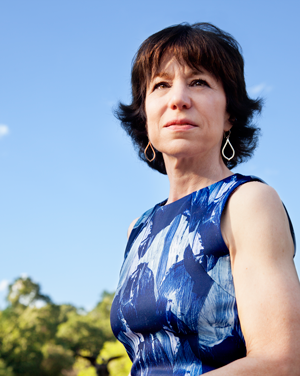
Maura Grossman. Photograph by Len Irish
“How do you handle large volumes of [electronically stored information] where there are only one or two associates on a matter and you’re not big on outsourcing to contract attorneys?”
For her, the answer lay with technology.
In 2009, Grossman crossed paths with Gordon Cormack, a professor of computer science at the University of Waterloo. Grossman thought that his methods for separating spam messages from regular email could be adapted for e-discovery.
“I saw what he had done with his spam filters and algorithms on a simulated legal task and was struck by how accurate they were,” Grossman says. “I approached him and asked what was in the secret sauce.”
The two collaborated on a groundbreaking 2011 paper, “Technology-Assisted Review in E-Discovery Can Be More Effective and More Efficient Than Exhaustive Manual Review.” The paper, published in the Richmond Journal of Law and Technology, essentially created the technology-assisted review field.
In 2014, the two published another paper, “Evaluation of Machine-Learning Protocols for Technology-Assisted Review in Electronic Discovery,” dubbed TAR 2.0. They found that attorneys get more accurate results from TAR if they employ “continuous active learning,” whereby lawyers continue to tweak and adjust the algorithm during the review process.
The duo, now engaged to be married, are both at the University of Waterloo; Grossman has left Wachtell for her own e-discovery consulting firm.
John Tredennick, founder and CEO of Catalyst, credits Grossman for following a rigorous scientific approach to produce results that showed, quantitatively, how inefficient and inaccurate the traditional method of e-discovery could be.
“To me the essence of rebel is that you challenge a major segment of the legal industry,” Tredennick says. “She wasn’t alone, but she was one of the few that actually got up and said ‘the emperor has no clothes’ to the masses and proceeded to show them how to fix the situation. How often do people do that?”
—V.L.
» Read extended profile of Maura Grossman
The Data Scientist at Law
David Colarusso taught high school physics for six years and co-founded a software business before going to law school, so it isn’t a stretch that he’s turned out to be a data scientist at law.
His first job out of law school in late 2011 was as a public defender in Massachusetts, immediately handling arraignments and bail hearings and soon trying cases. He’s still at the Committee for Public Counsel Services, which handles representation for indigent criminal defendants statewide. But he doesn’t take on cases anymore, though he sometimes analyzes and maybe tweaks huge batches of cases to improve the agency’s work—and justice itself.
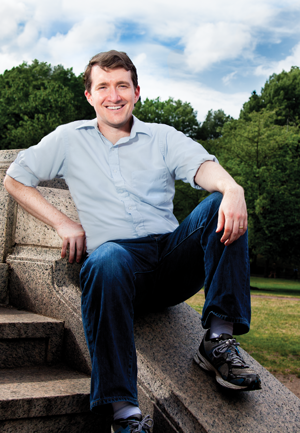
David Colarusso. Photograph by Len Irish
Colarusso, 37, is a hacker. He’s happiest when doing a deep dive into an information system, finding problems and creating fixes. He did just that in the wake of the state drug lab scandal in which a chemist had falsified tests of drug samples, tagging them positive, in tens of thousands of cases. The discrepancies were discovered in 2012, yet the number of tainted convictions still is unknown.
In 2014 the CPCS put Colarusso on temporary duty to sort through the mess and determine how many defendants were affected. Temporary assignment morphed into full time in 2015, and he works as part of the agency’s IT team—and its only lawyer.
His official title was data analyst, but he recently succeeded in getting it changed to data scientist because he applies data, mathematical formalism and experimentation to the field of law.
Colarusso’s combination of skill sets and interests is unique. He graduated from Cornell University in 2001 with a self-designed major in physics and science education via presentation in popular media. Then came a master’s degree in education from Harvard University, after which he began teaching high school physics and astronomy.
“I saw the skills he had, especially around data science, and thought the agency needed someone on IT who is a lawyer and can better understand the agency’s processes,” says Daniel Saroff, the agency’s CIO since 2014. “I have good technical people, but that doesn’t mean they understand what it takes to defend clients.”
—Terry Carter
» Read extended profile of David Colarusso
A New ‘PaTH’ for Her Firm
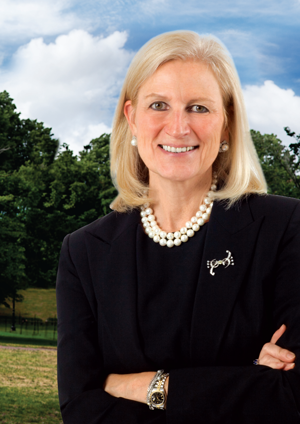
Deborah Read. Photograph Courtesy of Thompson Hine
As is her way, Deborah Z. “Debbie” Read used the five months from the time she was elected managing partner until beginning the job in May 2012 for deep-dive research and analytics. She read everything she could find in the Thompson Hine library on problems facing law firms, particularly on the heels of the 2008 recession.
“As I was preparing for this role,” Read says, “it became clear that the way law firms deliver services was not in line with what clients want in an economic downturn.”
A tax lawyer specializing in nonprofits (with clients such as the Rock & Roll Hall of Fame), Read, 59, is—by professional nature and instinct—cautious. But she was confident enough to take what some saw as a big risk as soon as hand touched helm.
At the next all-partners meeting of the nearly 400-lawyer, seven-office, 105-year-old Cleveland-based firm, Read sketched out the beginnings of fundamental changes in how they would operate. That redirection in some ways reflects her nature, in that it is analytical in practice and geared to efficiency.
With its own special touches and tools, Thompson Hine began retooling and changing approaches to practice, and in 2014 launched SmartPaTH (the “TH” is the firm’s initials), an institutional and structural framework for the firm and its work based on four prongs:
• Legal project management (the most important).
• Value-based pricing.
• Flexible staffing.
• Process efficiency.
Read had pored over several years’ worth of the consulting company Altman Weil’s annual Chief Legal Officer Survey, and she saw the same results year after year: a median score of 3 on a scale of 10 in answers to a question about the willingness of law firms to change delivery models rather than simply lower their rates.
“Our industry wouldn’t move off of 3,” says Read. “To me that is an opportunity. We can do better than 3 for sure.”
In March the firm was among the top seven in the country cited for innovation as “client service strategists,” in a survey of corporate counsel by the BTI Consulting Group.
—T.C.
» Read extended profile of Deborah Z. “Debbie” Read
A President Presses Buttons
Leaders in the organized bar don’t usually take up issues that are highly controversial within the profession itself—they’ll likely face plenty of controversy in the normal course of their terms. Why look for a fight (especially of the intraprofessional variety) in a prestigious and temporary role?
Because, says William C. Hubbard, “if we don’t do something on this justice gap, we’re putting at risk our ability to be a self-regulating profession.”

William C. Hubbard. Photograph by Randall Piland
During his ABA presidency in 2014-15, Hubbard chose to take on how to leverage technology and nonlawyer help to make the justice system accessible to the 80 percent of the population that can’t afford it.
Pushback was guaranteed when Hubbard, 64, created the Commission on the Future of Legal Services as he began his term, tasking it with a grassroots approach seeking workable solutions and geared to the viewpoint of legal services consumers—or, more precisely, those priced out of them. He mustered the ABA’s variety of resources and brought in stakeholders, such as the Conference of Chief Justices, the National Center for State Courts and the Federal Judicial Center to help the association get out in the lead for guiding developments.
The commission’s proposal for ABA policy in Resolution 105, titled Model Regulatory Objectives for the Provision of Legal Service, passed in the association’s House of Delegates at the midyear meeting in February. And it proved to be one of the most contentious matters before the House in years.
While some critics have gone so far as to say Hubbard’s effort will end the legal profession as we know it, supporters say he was right to climb aboard the engine of a moving train.
“In pursuing the interests of consumers as users of the legal system, he is bold and unafraid to court controversy, and gone where others fear to go,” says commission member James Sandman, president of the Legal Services Corp. “That’s quite unusual, particularly for someone leading a bar association.”
—T.C.
» Read extended profile of William Hubbard
Changing Government on Both Ends
Food service safety and revamping government may have little in common, but they show up as just part of the resumé for lawyer-entrepreneur Manik Suri.
A co-founder of the Governance Lab, which is out to improve how government works through “open and collaborative problem-solving,” Suri now leads MeWe, a company with an app focused on food-service regulation and compliance through mobile applications.
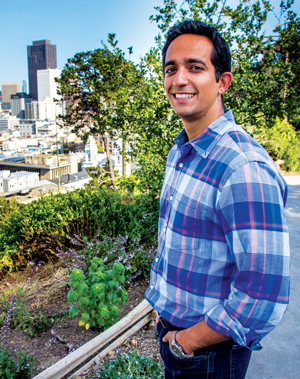
Manik Suri. Photograph by Tony Avelar
His experiences as a White House intern showed him that government could be more efficient, and technology would play a large role. “We saw social and commercial technology that changed the way we do everything,” says Suri, 33, a 2011 White House intern with the National Economic Council. “And in government, we saw the opportunity to do more in that space.”
Suri says his year with GovLab inspired MeWe: “I saw an opportunity to use technology to improve government at the other end of the spectrum—hyperlocal—specifically focused on local government inspections.”
The MeWe CoInspect app, launched in 2014, is a tool for quality and safety inspections. It reminds workers about rules in real time, helps perform audits and line checks, and offers simplified code definitions, as well as reference pictures. “With the app, employees can take photos and make notes that are time-stamped, so it’s easier to see what is actually being done, and how well it’s being done,” Suri says.
“He’s deeply intellectual about how he approaches a problem, but he always has a plan to figure out what the real and concrete things are that can be done for solutions,” says Andrew Crespo. A criminal law professor at Harvard Law School, he and Suri lived together as undergraduates.
“He’s always trying to learn everything he can about each new challenge he encounters, and he does that by seeking out people and asking them questions in a way that’s really inviting,” says Crespo. “He’s a great conversationalist.”
—S.F.W.
» Read extended profile of Manik Suri
Sidebar
LegalRebels.com
Visit LegalRebels.com, and while there, feel free to contribute your ideas for Box Breakers, and take a look at previous honorees on the site.
Meanwhile, at Legal Talk Network, check out podcasts with our Legal Rebels Trailblazers–people in the legal profession who have laid the groundwork for innovators of today and the future.
The Legal Rebels and Legal Rebels Trailblazers nominations are open year-round. Use the entry form on the LegalRebels.com website.



